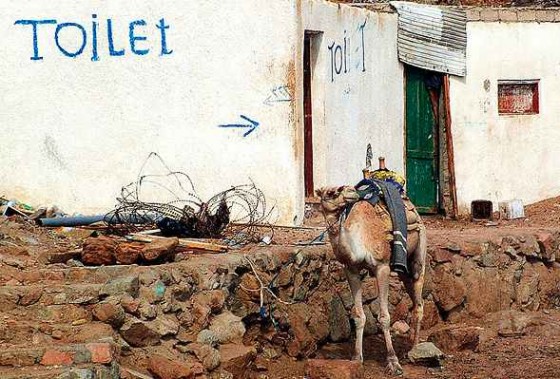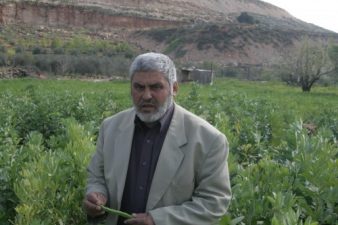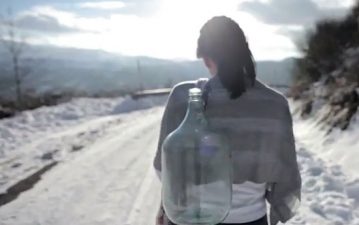
If you buy vegetables in Cairo, they could be contaminated with human waste.
Faced with a shortage of water for irrigation (and the fact it might lose its right to the Nile), Ahmed Osman, a farmer in his late thirties, opted to divert local sewage water to irrigate his two-hectare vegetable plot in the heart of Egypt’s Nile Delta governorate of Sharkia. “Without water, any water, our plants will die, and we will go begging,” he said. “There can be no agriculture without water.”
He is not alone. Other farmers in his village, Kafr Saqr, are doing the same. But experts say the practice is dangerous, according to the UN news source IRIN.
“Villagers around this country have to use untreated sewage to irrigate their land because Nile water is becoming so scarce; the nation’s sewage treatment plants do not function properly, and irrigation canals are not dug everywhere,” said Maghawri Shehata, a leading water expert and former president of Monofiya University. “Egypt needs to take action to stop this or it will be in for major catastrophes in the future.”
Given its rapidly rising population, Egypt is fast becoming water poor, and this is taking its toll on agriculture. As a result more and more farmers are now using pumps to siphon thousands of cubic metres of untreated sewage onto their farms to keep the crops growing. The sewage-dependent vegetables and fruits end up in markets as far away as Cairo and as near as Kafr Saqr. Health experts say the practice is dangerous.
Health risks of sewage
“Untreated sewage is full of harmful matter,” said Mahmud Amr, a toxicology expert. “Using it in irrigating vegetables and fruits could result in serious health hazards.”
A 2009 study of the waterways and canals in the Nile Delta, conducted by the State Ministry for Environmental Affairs, found concentrations of harmful materials in these waterways and canals exceeded permissible limits.
“Organic matter concentration (biochemical oxygen demand) exceeded the permissible limit (6mg/l) at all canals,” said the report, which was included in Egypt’s 2009 State of the Environment Report.
The study found that average ammonia concentrations at most monitoring points in Delta canals exceeded permissible limits. It also found an E. coli bacterial count exceeding safe limits (1,000 cells per 100 ml) as prescribed by the World Health Organization.
According to medical experts, there could be a link between the rise in the number of kidney failure, liver cancer and respiratory disease cases in Egypt and the use of unclean water for irrigating vegetable and fruit farms.
In 2009, a report presented to the Egyptian parliament warned against irrigating plants with untreated sewage.
Sewage can be adapted for agricultural use if properly treated, said Khalid Al Qadi, an environmental expert and professor at Helwan University . “The problem is that sewage treatment in this regard is very costly.”
Osman, meanwhile, dismisses talk of the danger of using untreated sewage: “Some people like to talk only. What else can people like me do while clean water is a dream?”
Sharing the Nile
The River Nile is the world’s longest river and serves nine African countries.
Over the years, Egypt’s allotted share of 55.5 billion cubic metres has proven insufficient to meet the needs of a growing population now numbering about 85 million – three times more than it was when Egypt and Sudan signed an agreement on sharing the Nile’s water in 1959. Currently, agriculture is responsible for 70 percent of water consumption in the country.
“There is a clear water deficit of between 10 and 15 billion cubic metres here,” said water expert Shehata. “This shortage is expected to grow even more in line with population growth.”
A symptom of water’s political significance was seen with the July 2010 protest by 600 people from the southern governorate of Minya, who came to the Irrigation Ministry in Cairo to display their anger at the lack of it.
The problem is likely to get worse because upstream Nile Basin countries like Ethiopia and Uganda, which also have rapidly growing populations are pushing for a greater share of the water to satisfy their own needs.
In 2010, six upstream countries met in Uganda and signed a new water-sharing agreement. Egypt and Sudan did not sign, and called instead for fresh talks involving all riparian states. In the last few months, the new Egyptian government has sent emissaries to various Nile Basin countries to pursue the issue.
Read more water news from Egypt:
Egypt Holds Tight to Nile Rights
Defiant Ethiopia to Proceed With Massive Nile Dam
American Elections Are Bad for the Nile Delta
In the Face of “Nilelessness,” Egyptians Protest Water Shortages
Image via alan l priest




Comments are closed.